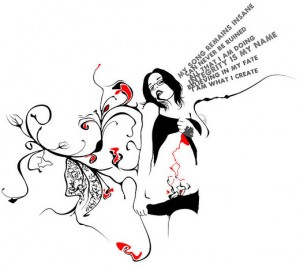
Click here for original image.
Holly Lisle in her writing tips newsletter today wrote about plagiarism and being a “real writer.”
I put “real writer” in quotes not for sarcastic effect. I put those words in quotes because those are the words Holly herself used, and I agree with them completely. She talks about some would-be aspiring authors, as it were, looking for an easy way to rip off 100,000 words of others’ work, run it through an automated computer program, and come out with a supposedly original story. These are not “real writers.”
Then Holly said, “People who live their lives always looking for ways to get their hands on things they have not earned never do anything worthwhile. Never create anything worthwhile.”
I am what I create
Believing in my fate
Integrity is my name
All that I am doing
Can never be ruined
My song remains insane
“Eye for an Eye”
Soulfly
Coincidentally, this morning, I rewrote the blog post “Writing as a Spiritual Walk,” for the intro of Character Fiction 101.

Click here for the original image.
I’m convinced that one of the core reasons writers write is for spiritual fulfillment. But there are two aspects of spirituality.
Some writers focus on the external: more words, more books, more publishing contracts, more fans, more fame, more money. At the extreme, this pursuit can result in plagiarism and other ethical lapses. Remember James Frey’s “semi-fictional memoir” A Million Little Pieces? When the “semi-fictional” revelation came out, how many people felt betrayed beyond the ability of a full refund to make amends? But Frey wasn’t the first to fictionalize his memoir, nor will he be the last.
Now, I’m not claiming to have a direct line into James Frey’s psyche. I don’t actually know why he fabricated parts of his life and then failed to include this little tidbit of information in the original publicity information packets. I do know that if we only focus on the external rewards of writing, we may find ourselves selling our values to the devil for a little temporary fame or fortune.
Other writers focus on the internal, on observations and thoughts and feelings, on a Zen-like understanding of nature, on refining and enhancing our perceptions. On finding the perfect word to describe what we feel. Some of us spend years planning our “next book,” and years more writing and editing and revising and rewriting and reediting and rerevising and rerewriting and rereeding and… And sometimes, I admit, I’m guilty of going down this path, because I agree with King Solomon: “Blessed is the man who finds wisdom, the man who gains understanding… Her ways are pleasant ways, and all her paths are peace. She is a tree of life to those who embrace her; those who lay hold of her will be blessed.”
Now, of these two aspects of spirituality, I spend an inordinate amount of energy lambasting the former and pushing the latter, because the industry tends to glorify the external, sometimes so much that it appears there’s no other yardstick of “success.” We look up to those writers who sell lots of books, to raves from a broad array of cheering fans, no matter how profane the work may be. At some level, we seek spiritual fulfillment in this brand of “success,†because we instinctively believe that if that many people knew of us and looked up to us—the way that we swoon over other top-selling authors—then we’d be part of something bigger than ourselves. And we dream that if only we could have a best-seller, “breakout†novel like that, then we’d be happy and fulfilled. But ask the writers who have “made it.†That kind of fulfillment is only skin-deep. True spirituality comes from within, not from without.
Nonetheless, only when we engage both the internal and external, each in balance with the other, will we find true spiritual fulfillment in our writing. Only when we find the truth boiling away inside our souls and bring it to the world in concrete form, only then will we have completed the cycle.
The first step, I believe, is to admit that you are not going to be as “successful” as Stephanie Meyer or J.K. Rowling or Stephen King or Neil Gaiman— or Holly Lisle. That’s a liberating admission, because then you are free to follow the path that fate has laid out for you yourself…
But that’s another blog post.
Keep writing!
-TimK
Leave a Reply